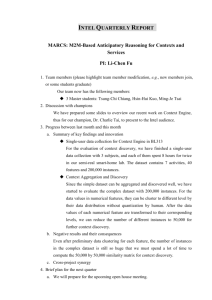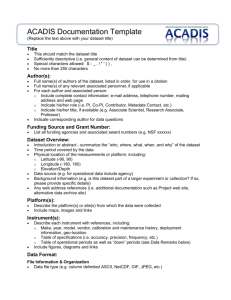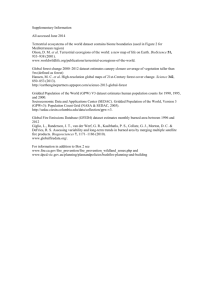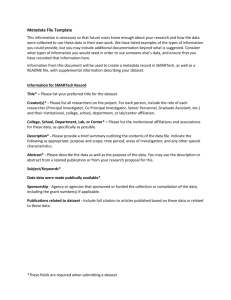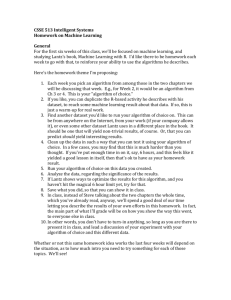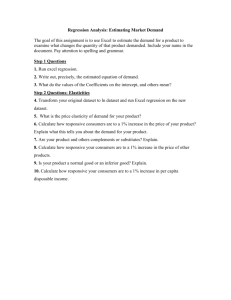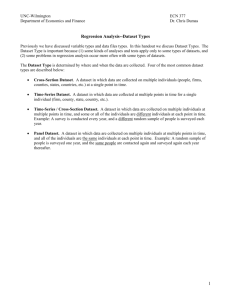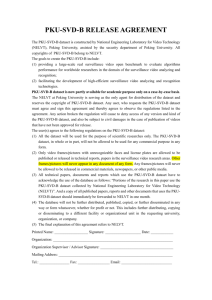paper dataset
advertisement
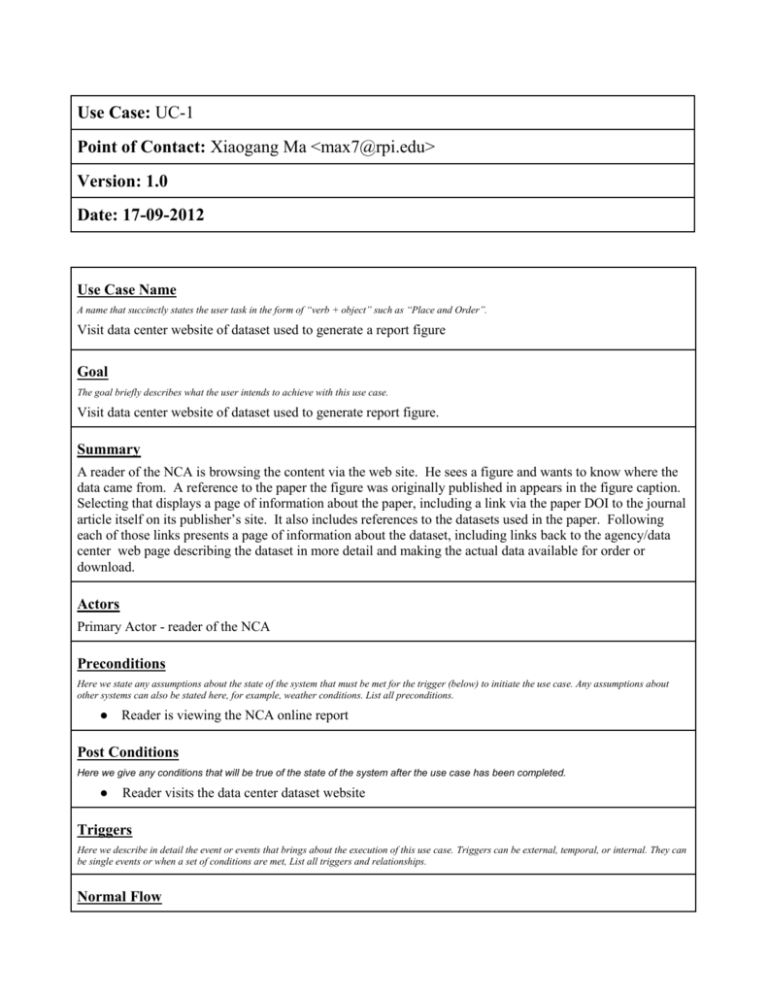
Use Case: UC-1 Point of Contact: Xiaogang Ma <max7@rpi.edu> Version: 1.0 Date: 17-09-2012 Use Case Name A name that succinctly states the user task in the form of “verb + object” such as “Place and Order”. Visit data center website of dataset used to generate a report figure Goal The goal briefly describes what the user intends to achieve with this use case. Visit data center website of dataset used to generate report figure. Summary A reader of the NCA is browsing the content via the web site. He sees a figure and wants to know where the data came from. A reference to the paper the figure was originally published in appears in the figure caption. Selecting that displays a page of information about the paper, including a link via the paper DOI to the journal article itself on its publisher’s site. It also includes references to the datasets used in the paper. Following each of those links presents a page of information about the dataset, including links back to the agency/data center web page describing the dataset in more detail and making the actual data available for order or download. Actors Primary Actor - reader of the NCA Preconditions Here we state any assumptions about the state of the system that must be met for the trigger (below) to initiate the use case. Any assumptions about other systems can also be stated here, for example, weather conditions. List all preconditions. ● Reader is viewing the NCA online report Post Conditions Here we give any conditions that will be true of the state of the system after the use case has been completed. ● Reader visits the data center dataset website Triggers Here we describe in detail the event or events that brings about the execution of this use case. Triggers can be external, temporal, or internal. They can be single events or when a set of conditions are met, List all triggers and relationships. Normal Flow Often referred to as the primary scenario or course of events. In the basic flow we describe the flow that would be followed if the use case where to follow its main plot from start to end. Error states or alternate states that might be highlighted are not included here. This gives any browser of the document a quick view of how the system will work. Here the flow can be documented as a list, a conversation or as a story.(as much as required) 1) System is presenting the NCA report to the reader in a web site. Presentation includes report figure with caption that includes reference to paper. 2) Reader selects paper reference in figure caption. 3) System displays information about paper, including link (via paper DOI) to the journal article publisher page. Paper information includes paper dataset citations. 4) Reader selects a dataset cited by the paper. 5) System displays information about the dataset including links to agency / data center pages where more information and (potentially) data download links are available. 6) Reader selects data center link and is redirected to data center dataset webpage. Alternate Flows Here we give any alternate flows that might occur which still lead to a successful completion of the task and satisfy the use case’s post-conditions. ● 1 ● 2 ● 3 Exception Flows Here we describe how the system responds to conditions that prevent the task from succeeding. Use case post-conditions may not be satisfied at completion of Exception Flow. Activity Diagram Here a diagram is given to show the flow of events that surrounds the use case. It might be that text is a more useful way of describing the use case. However often a picture speaks a 1000 words. Activity Diagram Caption Includes Reference any use cases that are included in this use case, e.g. “FOO UC-22 View Shopping Cart”. Priority How important is this task to implement? Useful to help manage project priorities and dependencies. Source What user champion, business rule, or high-level system requirement does this use case originate from? Who or where can we go for clarification? Frequency of Use How often do we expect the targeted user classes to perform this task? Business Rules Reference business rules that are related to this task, (e.g. BR-28 Only staff who are authorized may update the database) Special Requirements Interoperability requirements, security requirements, regulatory compliance requirements, etc. related to this user task. Assumptions The normal and alternate flows probably make some assumptions; this is a good place to state them. ● Figure caption contains a paper reference ● Referenced paper has a DOI ● Referenced paper has data citations ● There exists an identifier / locator for the dataset as owned by the agency / data center ● There exists an agency / data center website for the dataset Notes There is always some piece of information that is required that has no other place to go. This is the place for that information. Resources In order to support the capabilities described in this Use Case, a set of resources must be available and/or configured. These resources include data and services, and the systems that offer them. This section will call out examples of these resources. Data: Data Type Characteristics Description Owner Source System (dataset name) Remote, e.g. – no cloud cover USGS, ESA, etc. Name of the system which supports discovery and access Frequency Source System How often the model runs Name of the system which offers access to the model In situ, Etc. Short description of the dataset, possibly including rationale of the usage characteristics Modeling Services Model Owner Description Consumes (model name) Organization that Short description List of data consumed offers the model of the model Event Notification Services Event Owner Description (Event name) Organization that Short description of the event offers the event Subscription Source System List of subscriptions (and owners) Name of the system which offers this event Application Services Application Owner Description Source System (Application or DSS name) Organization that Short description of the application, DSS or portal Name of the system which offers the offers access to this Application resource Sensor resources Sensor Owner Description (sensor name) Organization that Short description of the sensor owns/ manages sensor Frequency Source System How often the sensor Name of the satellite or can observe event system which manages sensor
